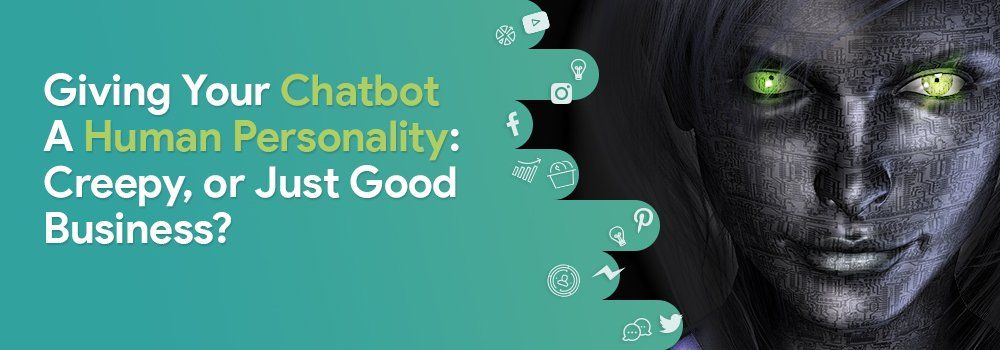
Giving Chatbot A Human Personality: Creepy or Just Good Business?
One of the many things that make building a chatbot so interesting is identifying and crafting its personality.
In ways, it’s a challenge that a scriptwriter or author would be more familiar with, than a developer. But as chatbots start to populate our online business experiences, their personalities will become increasingly relevant.
Already there has been much discussion around whether chatbots should even try to mimic a human; let alone become indistinguishable from real humans as AI technology becomes more sophisticated.
One side thinks we shouldn’t even start.
Some people think it’s annoying at best, and deceptive at worst. When a customer finally realises they were talking to a computer, they believe, it’s likely to make that customer more cautious in the future. It will damage their trust in the authenticity of instant messaging.
Keep chatbots obviously soulless automatons, an interactive FAQ.
The other side of the debate says that a chatbot should indeed communicate like a real person. In fact, some say it should be better than human, meeting a higher expectation than even a human operator would.
Helpful, insightful, and even able to anticipate what the customer will want – and sell that in with charm and wit.
So. Create a personality, or not? Boring and dull, or full of character? And if the latter, should it be a representation of any one person, or a personality in its own right?

Create a chatbot personality? Answer: Yes.
Your chatbot, like any other marketing asset in your business, is a representation of your brand. Your logo, your digital assets, your team’s processes, even the language and tone of your communications are part of how your business presents itself to customers.
At the very least, your chatbot should be the same. But then comes the next question – how far should that personality go? A faithful representation of the brand, or an enthusiastic brand champion?
Traditionally, machines are ‘safe.’ They do what they’re expected to do and no more. Logical, functional. And yes, boring. Dull. Dry.
Most starter chatbots are like that. They’re there to perform a specific function, and as long as that happens, the customer experience is generally positive. In that context, it’s ok to be traditional because it does a job.
Then the Chatbot comes to life!
But then you encounter a chatbot with wit. It sneaks a pun into the conversation. It drops an emoji – or a cat gif. You smile. You’re engaged.
Instead of forcing you to click quick replies, it lets you type your request. You ask ask a question in normal language, and it gives an appropriate response.
The sense that you’re relating to someone, and not just something, becomes stronger. You begin to believe that there is sentience behind the banter. That the bot is enjoying the jokes as much as you are.
Suddenly it has moved from being a functional query-and-order response to being a genuine exchange, with genuine feelings.
That is when the experience becomes memorable.
“Memorable’ doesn’t necessarily mean ‘positive.’ A bad chatbot can, as suggested earlier, create a negative user experience that damages the brand.
The worst a chatbot can do isn’t just fail to engage. A chatbot that delivers off-topic, irrelevant or downright strange conversation can be horrifying.

But assuming the experience is memorable and positive, you have, as they say, struck gold. Your chatbot is no longer just the query-and-order taker. It has become a point of difference for the user who interacts with it. The chances of doing business with you are higher: the chances of the user moving to your competitor have plummeted.
And that is the first clue that personality really is important in a chatbot.
Chatbot Clone or Individual?
Many small business owners find a chatbot indispensable for handling queries and qualifying leads. As their proxy, it’s tempting to make the chatbot a copy of themselves, either using their own profile pic or a ‘cartoonified’ version.
And that’s not such a bad idea.
If the chatbot is an extension of you, and especially if your customers prefer to deal with you directly, it’s good business to give them what they want. A savvy front-facing operator will understand the importance of presenting the personal brand.
What’s debatable is whether you want people to think they’re actually talking to you. A digital chatbot version of yourself is still not actually you.
Could Customers be Fooled?
Technology is making it easier to automate believable conversations. Customers may even think they’re dealing with the “real” you. (How long before the first AI chatbot passes the famous Turing test?)
But arguably that could damage their trust and loyalty in you. To be safe, the caricature or cartoony version is a no-brainer.
For bigger business, it’s another story. This is when you can create a separate personality for the chatbot – ideally a personality that fits your brand. Whatever attributes your brand has – its values, tone, and even quirks – can be reflected in the personality of your chatbot.
Whatever attributes characterise your brand – its strengths, values, tone and ethos – can be reflected in the personality of your chatbot.
A Chatbot On The Shoulders of Giants
This is where the superstars of your team can contribute. The high-performing chatbot’s personality could be built on the performance, expertise, and customer knowledge of your key forward-facing staff.
And with that… your bot comes alive. Whether a clone or an individual in its own right, a chatbot should have personality. It should represent your brand with all the enthusiasm and charm you or your team would.
Conversologie has been designing, building and fine-tuning chatbots with personality for small-to-medium business since 2017. In 2018 we entered a partnership with Ako.ai, pioneer AI and machine-learning bot-builder for enterprise and corporate solutions.



